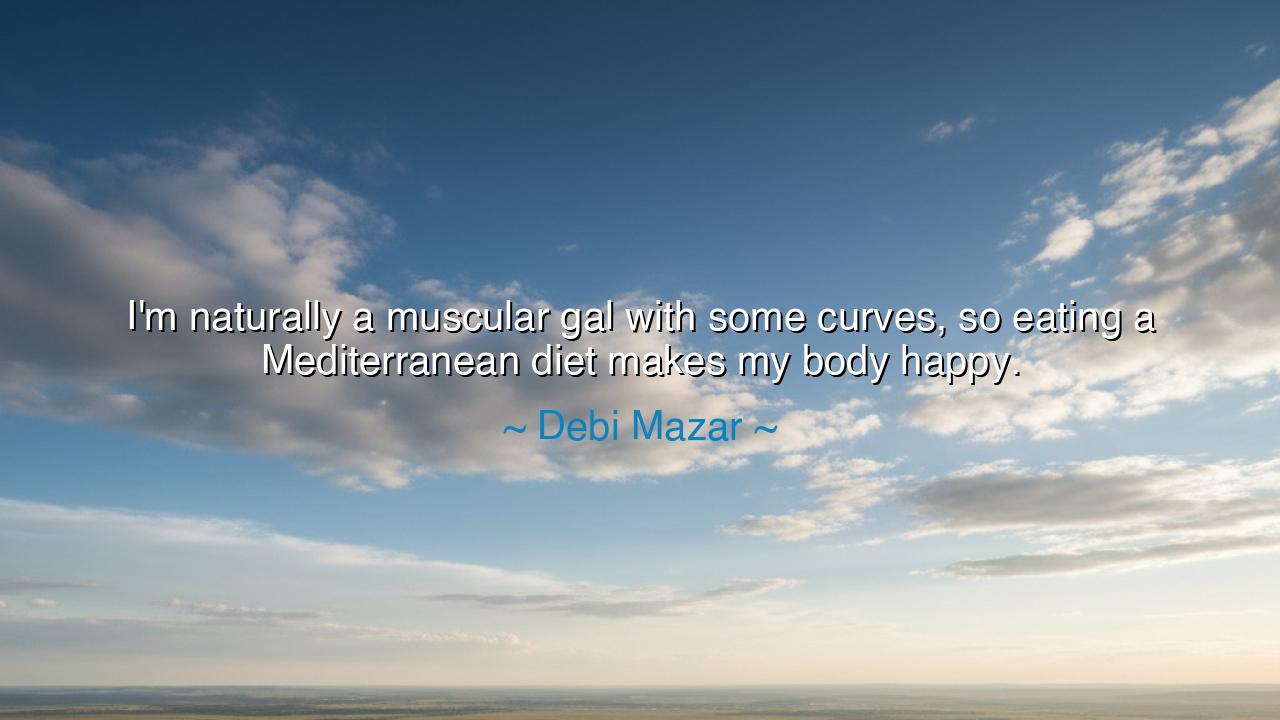
I'm naturally a muscular gal with some curves, so eating a
I'm naturally a muscular gal with some curves, so eating a Mediterranean diet makes my body happy.






In the radiant and self-assured words of Debi Mazar, we hear an ode to acceptance, balance, and the harmony between body and nature: “I’m naturally a muscular gal with some curves, so eating a Mediterranean diet makes my body happy.” Though simple on its surface, this declaration holds a wisdom as old as the olive groves of Greece and the sun-drenched shores of Italy. It speaks of knowing oneself—not in vanity, but in reverence—and of living in alignment with one’s true form and natural rhythm. Her words remind us that beauty and strength do not come from defying nature, but from embracing it with grace and understanding.
To say that one is “naturally muscular with curves” is to proclaim acceptance of one’s own design, a rare courage in a world that constantly demands transformation. Mazar’s statement is a quiet rebellion against the illusion of perfection, a refusal to conform to a single mold of beauty. She knows, as the ancients did, that health and harmony arise when one honors the shape and spirit given by the gods. The Greeks called this kalokagathia—the ideal of unity between the good and the beautiful, the body and the soul. To live well was not to strive for a foreign image, but to cultivate one’s own nature to its fullest bloom. Thus, Mazar’s “muscular gal” is not a confession—it is a hymn to authenticity.
Her devotion to the Mediterranean diet carries within it not only a practical choice but a spiritual lineage. This diet—rich in olive oil, grains, fruit, fish, and wine—has its roots in the wisdom of lands where the body and earth have long been companions. To eat from the sea and the soil, to feast in moderation yet with joy, to nourish oneself with simplicity and purity—this was the way of the ancient Mediterraneans, whose hearts were warmed by sunlight and whose spirits were sustained by community. It is a way of eating that mirrors the rhythm of life itself: generous but balanced, vital yet calm. When Mazar says it makes her body happy, she is echoing the same truth that sustained the ancients: that food is not just fuel, but communion with life itself.
The philosopher Hippocrates, father of medicine, once said, “Let food be thy medicine and medicine be thy food.” His words find new life in Mazar’s statement. For what she describes is not a diet of calculation or denial, but a relationship—a dialogue between the body and its sustenance. The Mediterranean diet is more than a list of ingredients; it is an ethos, a celebration of balance, pleasure, and connection. Each meal becomes an act of gratitude: to the earth that nourishes, to the body that serves, to the spirit that delights. In this harmony lies healing, both physical and emotional. Her “body is happy” not merely because it is well-fed, but because it is honored—listened to, understood, and loved.
Yet her wisdom carries another message, one of freedom from the tyranny of self-denial. The ancients taught that temperance, not restriction, is the key to virtue. The Mediterranean way embodies this perfectly: a glass of wine shared with laughter, a drizzle of oil over warm bread, a handful of olives eaten slowly beneath the sun. It is the diet of those who knew that to live well is to live joyfully—but never wastefully. Mazar’s words remind us that one can be both disciplined and delighted, that the path to health does not require punishment, but balance. In this, she follows the timeless principle of moderation—the golden mean praised by Aristotle, who said that excellence lies not in extremes, but in harmony.
Her message also speaks to the feminine spirit—to the courage of loving one’s form not for how it conforms, but for how it expresses strength, vitality, and history. The curves she mentions are not flaws but symbols of abundance, of the sacred energy that sustains life. The muscular form is not harshness but power shaped by motion, by dance, by labor. In her acceptance, she stands beside the goddesses of antiquity—Aphrodite, radiant in her natural beauty, and Artemis, strong and untamed. Both divine, both whole. Mazar’s words recall that dual inheritance: the joy of the body’s softness, and the pride of its strength.
From her statement arises a lesson of enduring relevance: Know thyself and honor thy nature. Do not eat, move, or live according to the demands of others, but according to the rhythm of your own being. Choose nourishment that sustains your vitality rather than suppresses your joy. Feed not only your body, but your spirit—through food that grows from the earth, through company that warms the heart, through habits that reflect balance rather than obsession. This is the Mediterranean way, and indeed, the way of all wisdom: a life where health and happiness are not rivals, but companions walking hand in hand.
So, let Debi Mazar’s words remind you, O seeker of balance, that the greatest diet is not one of numbers or restrictions, but of harmony. Eat with gratitude, live with awareness, and celebrate the body you have been given. For when we live in accord with our own nature, when we listen to what brings us peace and energy, the body rejoices—and the spirit sings. This is not vanity; it is reverence. It is the ancient art of living well, passed down through the ages, from the olive tree to the heart of every soul who dares to be at peace within their own skin.






AAdministratorAdministrator
Welcome, honored guests. Please leave a comment, we will respond soon